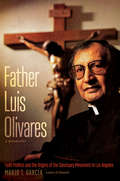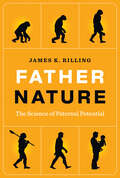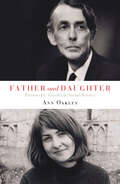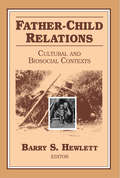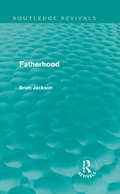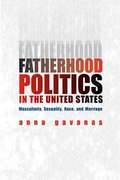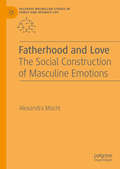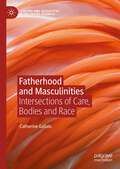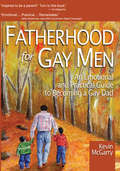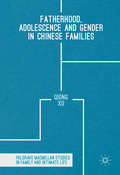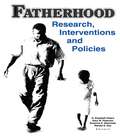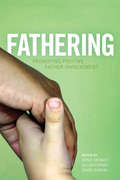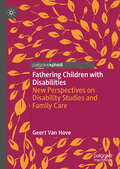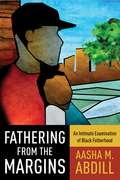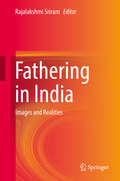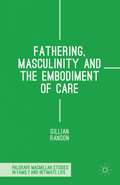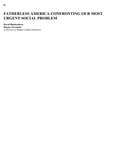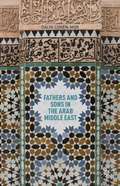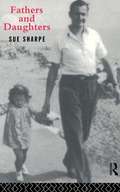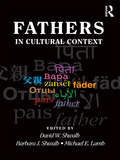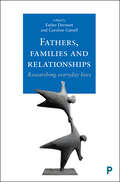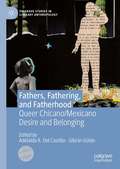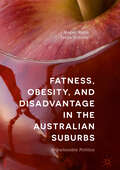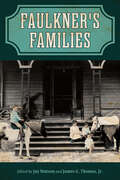- Table View
- List View
Father Luis Olivares, a Biography: Faith Politics and the Origins of the Sanctuary Movement in Los Angeles
by Mario T. GarcíaThis is the amazing untold story of the Los Angeles sanctuary movement's champion, Father Luis Olivares (1934–1993), a Catholic priest and a charismatic, faith-driven leader for social justice. Beginning in 1980 and continuing for most of the decade, hundreds of thousands of Salvadoran and Guatemalan refugees made the hazardous journey to the United States, seeking asylum from political repression and violence in their home states. Instead of being welcomed by the "country of immigrants," they were rebuffed by the Reagan administration, which supported the governments from which they fled. To counter this policy, a powerful sanctuary movement rose up to provide safe havens in churches and synagogues for thousands of Central American refugees.Based on previously unexplored archives and over ninety oral histories, this compelling biography traces the life of a complex and constantly evolving individual, from Olivares's humble beginnings in San Antonio, Texas, to his close friendship with legendary civil rights leader Cesar Chavez and his historic leadership of the United Neighborhoods Organization and the sanctuary movement.
Father Nature: The Science of Paternal Potential
by James K. RillingHow and why human males evolved the capacity to be highly involved caregivers—and why some are more involved than others.We all know the importance of mothers. They are typically as paramount in the wild as they are in human relationships. But what about fathers? In most mammals, including our closest living primate relatives, fathers have little to no involvement in raising their offspring—and sometimes even kill the offspring sired by other fathers. How, then, can we explain modern fathers having the capacity to be highly engaged parents? In Father Nature, James Rilling explores how humans have evolved to endow modern fathers with this potential and considers why this capacity evolved in humans.Paternal caregiving is advantageous to children and, by extension, to society at large, yet variable both across and within human societies. Rilling considers how to explain this variability and what social and policy changes might be implemented to increase positive paternal involvement. Along the way, Father Nature also covers the impact fathers have on children&’s development, the evolution of paternal caregiving, how natural selection adapted male physiology for caregiving, and finally, what lessons an expecting father can take away from the book, as well as what benefits they themselves get from raising children, including increased longevity and &“younger&” brains.A beautifully written book by a father himself, Father Nature is a much-needed—and deeply rewarding—look at the science behind &“good&” paternal behavior in humans.
Father and Daughter: Patriarchy, Gender and Social Science
by Ann OakleyFather and daughter provides an unique ‘insider perspective’ on two key figures in twentieth-century British social science. Ann Oakley, a highly respected sociologist and best-selling writer, draws on her own life and that of her father, Richard Titmuss, a well-known policy analyst and defender of the welfare state, to offer an absorbing view of the connections between private lives and public work. Using an innovative mix of biography, autobiography, intellectual history, archives, and personal interviews, some of which have not been previously available to the public, she provides a compelling narrative about gender, patriarchy, methodology, and the politics of memory and identity. This fascinating analysis defies the usual social science publications to offer a truly distinctive account which will be of wide interest.
Father-Child Relations: Cultural and Biosocial Contexts (Foundations Of Human Behavior Ser.)
by Barry S. HewlettDue to a greater involvement of American fathers in the direct care of their children in recent years, interest in the impact and nature of the father's role in nurturing children has increased. While studies about fathers in the industrialized, literate West have proliferated, little is known about the role of fathers in the preliterate, non-Western world. This collection examines the diversity of paternal roles found in human cultures among various types of societies that are very peaceful and those that actively engage in warfare as a mode of existence.Father-Child Relations recognizes the importance of understanding both biological and cultural aspects of the father's role. Many of the contributors utilize evolutionary or biosocial models, including those of developmental psychology, to examine the father's role, while others rely upon the symbolic analysis of cultural and social anthropology. One chapter is devoted to male-infant relationships in nonhuman primates, a further largely ignored comparative perspective.The anthropologists who have contributed to this collection are field workers who have lived intimately over significant periods of time with the people about whom they are writing. These research reports from the field have been edited to make them wholly accessible to the non-specialist. The contributors of this volume recognize that biology and ideology are intertwined; both together influence the father's behavior and the effects of his behavior.
Fatherhood (Routledge Revivals)
by Brian JacksonFirst published in 1984, this groundbreaking title explores the concept of fatherhood, by following a hundred men who become fathers for the first time. The book is addressed to men who are discovering fatherhood and to women who wish to hear what a man feels and thinks about having a child. Many men experience the strange problems of the male couvade. They have everything from mysterious back ache to inexplicable stomach pains. Later they frequently find that the white-coated professionals shut the door on their doubts and needs and their shy search for information. Brian Jackson’s book cautiously explores changing attitudes to fatherhood emerging at the time of the book’s initial publication. In recent years we have gone through a unique revolution in man’s experience of woman and child. There is surprise at the costs and demands of parenthood, so much so that both parents may move from a honeymoon phase of parenthood into the birth of the blues. Previously this has been thought of as a female, hormonal readjustment, but since men speak of identical symptoms, this study suggests that, at the roots, lies the strain of unprepared parenthood. The traditional father is still there – showing off his medals, his tattoos, his rugby triumphs and his unconcern for the gentler aspects of life. So is the man who simply hunts in the economic jungle, and expects his home to service him. But most of these men now waver and hedge their bets. They look at their child as they return from their working day, or as they slump into unemployment, and wonder if they could be more positive, more creative, more licensed to care.
Fatherhood Politics in the United States: Masculinity, Sexuality, Race, and Marriage
by Anna GavanasAre fathers being marginalized in the contemporary family? Responding to fears that they are, the self-proclaimed "fatherhood responsibility movement" (FRM) has worked since the mid-1990s to put fatherhood at the center of U.S. national politics. Anna Gavanas's Fatherhood Politics in the United States analyzes the processes, reveals the internal struggles, and traces the myths that drive this powerful movement. Unlike previous investigations that rely on literary or other secondary sources, Fatherhood Politics works from primary ethnographic material to represent a wider range of voices and actors. Interacting with and interviewing members of the most powerful and well-known national fatherhood organizations, Gavanas observed Promise Keeper rallies, men's workshops, and conferences on masculinity, fatherhood, and marriage. Providing a detailed overview of the different organizations involved and their various rhetorical strategies, Gavanas breaks down the FRM into two major wings. The "pro-marriage" wing sees marriage as the key to solving all social problems, while the "fragile family" organizations worry about unemployment, racism, and discrimination. Gavanas uses her extensive anthropological fieldwork as the basis for discussions of gender, sexuality, and race in her analysis of these competing voices. Taking us inside the internal struggles, tensions, and political machinations of the FRM, Gavanas offers a behind-the-scenes look at a movement having real impact on current social policy. Fatherhood Politics is an essential work for anyone interested in the politics of masculinity, parenthood, marriage, race, and sexuality.
Fatherhood and Love: The Social Construction of Masculine Emotions (Palgrave Macmillan Studies in Family and Intimate Life)
by Alexandra MachtThis book explores how contemporary men understand love in the realm of family life and how they integrate it into their identity. Drawing from Ian Burkitt’s aesthetic theory of emotions, Macht presents rich data from qualitative interviews and observations with Scottish and Romanian involved fathers, to reveal how they maintain closeness to their children, their partners and their own family of origin. Reflecting on distances, separations, power, worry and intergenerational experiences of love Fatherhood and Love hypothesizes that fathers’ identities and emotionality rely on a variety of social relationships in their intimate environment. A new concept, ‘emotional bordering’, is introduced, to portray the tensions inherent in fathers’ identities and illuminate why gender progress happens slowly. Engaging with literature on love, masculinity, culture and father’s involvement from a unique perspective, this book will be of interest to students and scholars across a range of social science disciplines.
Fatherhood and Masculinities: Intersections of Care, Bodies and Race (Genders and Sexualities in the Social Sciences)
by Catherine GallaisBased on novel ethnographic research conducted in New York City, this book explores through the lens of intersectionality how gender impacts men’s experiences of full-time fatherhood, as well as how sexuality, race, class, faith, and so on result in unequal access to choices and opportunities as parents. Chapters analyze how perspectives on caregiving are complicated by varying cultural, gendered, and racialized stereotypes and representations that pull different fathers toward or push them away from particular models of fatherhood in an urban context. Additionally, the author interrogates how societal conceptions of men’s bodies also play a role in how men understand their experiences of fatherhood. This book will be of interest to scholars and students studying gender, masculinity, and fatherhood.
Fatherhood and the British Working Class, 1865-1914
by Julie-Marie StrangeA pioneering study of Victorian and Edwardian fatherhood, investigating what being, and having, a father meant to working-class people. Based on working-class autobiography, the book challenges dominant assumptions about absent or 'feckless' fathers, and reintegrates the paternal figure within the emotional life of families. Locating autobiography within broader social and cultural commentary, Julie-Marie Strange considers material culture, everyday practice, obligation, duty and comedy as sites for the development and expression of complex emotional lives. Emphasising the importance of separating men as husbands from men as fathers, Strange explores how emotional ties were formed between fathers and their children, the models of fatherhood available to working-class men, and the ways in which fathers interacted with children inside and outside the home. She explodes the myth that working-class interiorities are inaccessible or unrecoverable, and locates life stories in the context of other sources, including social surveys, visual culture and popular fiction.
Fatherhood for Gay Men: An Emotional and Practical Guide to Becoming a Gay Dad (Race and Politics)
by Kevin McgarryGet the inside story on a single gay man's struggle to adopt! Fatherhood for Gay Men: An Emotional and Practical Guide to Becoming a Gay Dad is the story of one man's journey down the road less traveled-a single gay man adopting and raising his two sons. Author Kevin McGarry recounts his passage into parenthood after years of having his natural fathering instincts stifled by the limits-real and perceived-of being gay. This unique book details the emotional, financial, practical, and social realities of the adoption process for gay men. From the author: "We take risks by coming out of the closet as gay men and at the end of the day, we are emotionally happier because we took those risks. By coming out, we are being true to who we are. The same goes for anyone, gay or straight, who has gut instincts for parenthood. I knew over the years that I had parenting instincts because I had this incredible envy of other dads. I would watch them with their kids and wish that somehow, I could have that role. It was painful at times because being gay, I didn't think parenting was in my life plan. Had more role models been available to me, the process would have been a little less difficult." Much more than a "how-to" guide to adoption, Fatherhood for Gay Men is the personal account of a single gay man's struggle to become a father despite the real and imagined limitations of being a gay man. The book looks at the adoption process (domestic and international) from the inside, providing unique insight into: conducting a homestudy costs (fees and expenses) what countries allow men to adopt alternatives to adoption life as a new parent online resources and a state-by-state review of adoption laws, categorized by "Completely Legal," "Favorable Climate," "Mixed Success," and "Illegal" The book also includes results of the 2000 study by Gillian Dunne, senior researcher for the London School of Economics Gender Institute, of 100 gay fathers and fathers-to-be. "Fatherhood for Gay Men: An Emotional and Practical Guide to Becoming a Gay Dad is a heartfelt and heartwarming story of a father's refusal to be denied a family.Visit the Author's Web site at http://www.fatherhoodforgaymen.com
Fatherhood, Adolescence and Gender in Chinese Families
by Qiong XuLittle is known about the roles of fathers in non-western cultures. Given the changing socio-economic and political circumstances of China, Xu identifies the importance of investigating Chinese fathers, particularly in dual-earner families, as women's participation in the labour market increases. This study of father-daughter relationships examines their perspectives on their relationships and identities. The book seeks to understand how girls construct their feminine identities as teenage girls and how fathers understand their masculine identities outside the workplace. It further explores their family practices and how they negotiate parental authority and adolescent independence. Inviting us to think about Chinese people's attitudes, family practice, emotions and aspirations, which constitute a crucial complement to our understanding of the remaking of Chinese society and Chinese lives, Fatherhood, Adolescence and Gender in Chinese Families focuses on how the widespread social and economic reforms interact with traditional attitudes rooted in Confucianism to provide new contexts for parent-child and gender relationships.
Fatherhood: Research, Interventions, and Policies
by H. Elizabeth Peters Gary W Peterson Suzanne Steinmetz Randal D DayHow much power does a father have to influence his children's development? A lively and often heated public debate on the role and value of the father in a family has been underway in the United States for the past decade. Nevertheless, we are far from understanding the complex ways in which fathers make contributions to their families and children. Fatherhood: Research, Interventions, and Policies addresses the central questions of the role of fathers: What is the impact of father involvement on child outcomes? What factors predict increased involvement of fathers?Bringing together papers presented at the Conference on Father Involvement, this volume includes contributions by leading scholars in anthropology, demography, economics, family science, psychology, and sociology. Many of the contributors also address the implications of father involvement for family policy issues, including family leave, child care, and child support. Furthermore, the discussion of fatherhood ranges well beyond the case of intact, middle-class, white families to include fathers from various ethnic groups and socioeconomic classes and of varied marital status, including fathers of nonmarital children, single-father families, and nonresident fathers. Fatherhood: Research, Interventions, and Policies addresses both practical and theoretical concerns, including:the redefinition of fatherhood changes over time in research on fatherhood the predictive power of fathers’activities on their children's adult outcomes the correlation between fathers’income and their involvement with their nonmarital children the influence of fathers on their sons’probability of growing up to become responsible fathers the effects of divorce on father-son and father-daughter relationships interventions that help to keep divorced fathers in touch with their childrenThis comprehensive, powerful book combines pioneering empirical research with thoughtful consideration of the social and psychological implications of fatherhood. It is essential reading for researchers, policymakers, psychologists, and students of family studies, human development, gender studies, social policy, sociology, and human ecology.
Fathering
by Annie Devault Gilles Forget Diane DubeauIn the past few decades, researchers and practitioners have moved away from the idea of fatherhood as a single, monolithic concept. Examining the challenges of vulnerable fathers such as those in poverty or in prison, they have developed valuable new strategies for cultivating the positive involvement of fathers in the lives of their children.Drawing on the innovative work of Prospère, a Quebec organization that brought together fathers, university researchers, and health and social service practitioners, Fathering details innovative approaches that support positive father involvement. It provides numerous examples of strategies and interventions with fathers, lessons learned from these practices on how to better support vulnerable fathers and families, and in-depth information on ways of designing, implementing, evaluating, and disseminating the results of participatory action research (PAR) - a methodology which put fathers at the heart of the project's decision-making.
Fathering Children with Disabilities: New Perspectives on Disability Studies and Family Care
by Geert Van HoveThis book explores the often-forgotten role of fathers of children with disabilities. Bridging the gap between disability studies, family studies, and gender studies, it uncovers men's perspective on caring for children with disabilities and presents examples of famous fathers, such as general Charles de Gaulle, film director Dan Habib, and scholars Michael Bérubé and Phil Ferguson. Drawing on interviews with fathers of children with disabilities, the author explores what makes a father a 'good father' and presents fatherhood as an intense and dynamic journey of discovery, experienced together with the children, as a process of ‘becoming with’. The testimonies offer an insight into the lived experience of fathers and challenge the model of caring masculinity through a narrative approach, with the aim to answer burning questions: can we built research lines around the experiences of fathers? can we secure the father perspective within family research and within support services for families with children with disabilities? A must read for academics in social science, education, and medical fields.
Fathering from the Margins: An Intimate Examination of Black Fatherhood
by Aasha M. AbdillDespite a decade of sociological research documenting black fathers’ significant level of engagement with their children, stereotypes of black men as “deadbeat dads” still shape popular perceptions and scholarly discourse. In Fathering from the Margins, sociologist Aasha M. Abdill draws on four years of fieldwork in low-income, predominantly black Bedford-Stuyvesant, Brooklyn, to dispel these destructive assumptions. She considers the obstacles faced—and the strategies used—by black men with children.Abdill presents qualitative and quantitative evidence that confirms the increasing presence of black fathers in their communities, arguing that changing social norms about gender roles in black families have shifted fathering behaviors. Black men in communities such as Bed-Stuy still face social and structural disadvantages, including disproportionate unemployment and incarceration, with significant implications for family life. Against this backdrop, black fathers attempt to reconcile contradictory beliefs about what makes one a good father and what makes one a respected man by developing different strategies for expressing affection and providing parental support. Black men’s involvement with their children is affected by the attitudes of their peers, the media, and especially the women of their families and communities: from the grandmothers who often become gatekeepers to involvement in a child’s life to the female-dominated sectors of childcare, primary school, and family-service provision. Abdill shows how supporting black men in their quest to be—and be seen as—family men is the key to securing not only their children's well-being but also their own.
Fathering in India: Images and Realities
by Rajalakshmi SriramThis book covers the underexplored subject of ‘fathering’ in India. It delves into the shared aspirations of men in India to nurture their children in sensitively attuned ways within the culturally prescriptive context that governs men’s roles as providers and caregivers. This work is based on over two decades of intensive research in India on how different groups construct and experience fatherhood and fathering under changing circumstances. It unmasks the heterogeneity that exists within fathering in India through conversations with fathers across diverse contexts—in privileged economic situations and those in difficult home and family circumstances, having children with disability, single-parent fathers and fathers in the military. A separate section discusses fathering daughters and shared parenting. Images and role models in fathering are brought alive through analysis of Hindi films, the media, children’s literature and classical literature. The conceptual analysis moves beyond the power and control dimensions commonly used to describe Indian men and fathers, to highlight their resilience, adaptability, positive involvement and developmental trajectories. This volume is for scholars, researchers and practitioners in developmental psychology, human development and family science, sociology, early childhood education and psychiatry, pediatrics, community medicine and allied fields.
Fathering, Masculinity and the Embodiment of Care (Palgrave Macmillan Studies in Family and Intimate Life)
by Gillian RansonMany fathers are now providing hands-on, engaged care to babies and young children. This book draws on observations of, and interviews with, caregiving fathers, as well as analyses of fathers' memoirs and online blogs, to examine fathers' caregiving work as embodied practice and as lived experience.
Fatherless America: Confronting Our Most Urgent Social Problem
by David Blankenhorn"[A] well reasoned, empirically sound, and an important contribution to the public debate." — William J. Bennett, author of The Book of Virtues A compelling and controversial exploration of absentee fathers and their impact on the nation One of the most urgent and controversial books of the 90s, "'Fatherless in America' has instantly become a catch phrase" (Los Angeles Times). Blankenhorn defines the growing fatherlessness in America and how we can restore fathers to their rightful place in our families.
Fathers And Sons In The Arab Middle East
by Dalya Cohen-MorDrawing on insights from psychology, sociology, anthropology, religion, history, and literature, this book examines early and contemporary writings of male authors from across the Arab world to explore the traditional and evolving nature of father-son relationships in Arab families.
Fathers and Daughters (Male Orders)
by Sue SharpeFathers and Daughters explores the complex nature of this subject using the voices and experiences of both fathers and daughters. Sue Sharpe provides an examination of the important processes operating within the relationship such as those affecting gender roles, achievement, teenage sexuality, women's relationships with men and ageing. It is an original and captivating treatment of a strangely neglected subject. Sue Sharpe is a free-lance writer and researcher based in London.
Fathers in Cultural Context
by Michael E. Lamb David W. Shwalb Barbara J. ShwalbA CHOICE Outstanding Academic Title 2013! Winner, APA Division 52 Ursula Gielen Global Psychology Book Award, 2014! This new volume reviews the latest research on fathering from every continent, from cultures representing over 50% of the world’s population. International experts on 14 societies/regions discuss cultural and historical influences, variations between and within cultures, and socio economic conditions and policies that impact fathering. Contributors from several disciplines provide thought-provoking reviews of the empirical data to help us gain an understanding of fathering worldwide. Over 1,000 studies on fathering published in languages other than English are made accessible to readers around the world. The cultures were selected based on availability of substantial research on fathering; representation of worldwide geography; a balance between large, middle, and small populations; and significance for a global understanding of fathering. Each chapter features personal case stories, photos, and maps to help readers create an engaging picture for each culture. Empirical evidence is blended with the authors’ expert opinions providing a comprehensive view of what it is like to be a father in each culture. The book opens by explaining theoretical and methodological underpinnings of research on fathers. The main chapters are then organized by world regions—Asia and the Middle East, Africa, North and South America, Europe, and Australia. The conclusions chapter integrates and compares all the chapters, and makes suggestions for future research. Every chapter follows the same structure, making it easy for readers to compare fathers between cultures, or to compare chapters as a textbook:• Opening case story of one father’s life • Cultural/historical background and influences on fathers • Comprehensive review of research on fathering in that culture • Sub-cultural variations in fathering • Social/economic conditions and policies that impact fathering: divorce, never-married fathers, immigration and migration, and economic disparities • Government policies and laws relevant to fathering• Comparisons with fathers in other societies • Summary highlighting the most pertinent information presented in the chapter This thought-provoking anthology is also an ideal text for graduate or advanced undergraduate courses on child development, fathering, or family processes taught in family studies, psychology, sociology, anthropology, education, and gender/women’s studies, and ethnic studies departments. Practitioners, educators, policymakers, and researchers interested in the study of father involvement will also appreciate this book.
Fathers, Families and Relationships: Researching Everyday Lives
by Esther Dermott and Caroline GatrellIn this exciting book, leading fatherhood scholars from Europe and Scandinavia offer unique insights into how to research fathers and fatherhood in contemporary society. Outlining research methods in detail, including examples of large scale studies, online research, surveys and visual and aural methods, they explore how each approach worked in practice, what the benefits and pitfalls were, and what the wider and future application of the chosen research methods might be. Covering a wide range of subjects from non-resident fathers to father engagement in child protection, this major contribution to the field also critiques and addresses the notion that fathers, especially young fathers, can be ‘hard to reach’. Essential reading for both students and policy makers in a fast-growing area of interest.
Fathers, Fathering, and Fatherhood: Queer Chicano/Mexicano Desire and Belonging (Palgrave Studies in Literary Anthropology)
by Adelaida R. Del Castillo Gibrán GüidoBringing together a unique collection of narrative accounts based on the lived experience of queer Chicano/Mexicano sons, this book explores fathers, fathering, and fatherhood. In many ways, the contributors reveal the significance of fathering and representations of fatherhood in the context of queer male sexuality and identity across generations, cultures, class, and Mexican immigrant and Mexican American families. They further reveal how father figures—godfathers, grandfathers, and others—may nurture and express love and hope for the queer young men in their extended family. Divided into six sections, the book addresses the complexity of father-queer son relationships; family dynamics; the impact of neurodiverse mental health issues; the erotic, unsafe, and taboo qualities of desire; encounters with absent, estranged or emotionally distant fathers; and a critical analysis of father and queer son relationships in Chicano/Latino literature and film.
Fatness, Obesity, and Disadvantage in the Australian Suburbs: Unpalatable Politics
by Megan Warin Tanya ZivkovicThis ethnography takes the reader into the Australian suburbs to learn about food, eating and bodies during the highly political context of one of Australia’s largest childhood obesity interventions. While there is ample evidence about the number of people who are overweight or obese and an abundance of information about what and how to eat, obesity remains ‘a problem’ in high-income countries such as Australia. Rather than rely on common assumptions that people are making all the wrong choices, this volume reveals the challenges of ‘eating healthy’ when money is scarce and how, different versions of being fat and doing fat happen in everyday worlds of precarity. Without acknowledgement of the multiple realities of fatness and obesity, interventions will continue to have limited reach.
Faulkner's Families (Faulkner and Yoknapatawpha Series)
by Jay Watson and James G. ThomasContributions by Josephine Adams, Jeff Allred, Garry Bertholf, Maxwell Cassity, John N. Duvall, Katherine Henninger, Maude Hines, Robert Jackson, Julie Beth Napolin, Rebecca Nisetich, George Porter Thomas, Jay Watson, and Yuko YamamotoIf it seems outrageous to suggest that one of the twentieth century’s most important literary cartographers of the private recesses of consciousness is also among its great novelists of family, William Faulkner nonetheless fits the bill on both counts. Family played an outsized role in both his life and his writings, often in deeply problematic ways, surfacing across his oeuvre in a dazzling range of distorted, defamiliarized, and transgressive forms, while on other occasions serving as a crucible for crushing forces of conformity, convention, and tradition. The dozen essays featured in this collection approach Faulkner’s many families—actual and imagined—as especially revealing windows to his work and his world. Contributors explore the role of the child in Faulkner’s vision of family and regional society; sibling relations throughout the author's body of work; the extension of family networks beyond blood lineage and across racial lines; the undutiful daughters of Yoknapatawpha County; the critical power of family estrangement and subversive genealogies in Faulkner’s imagination; forms of queer and interspecies kinship; the epidemiological imagination of Faulkner’s notorious Snopes family as social contagion; the experiences of the African American families who worked on the writer’s Greenfield Farm property; and Faulkner’s role in promoting a Cold War–era ideology of “the family of man” in post–World War II Japan.
